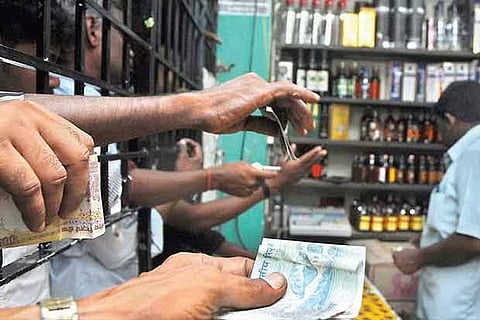

New Delhi
Sale of Indian-made foreign liquor declined 29 per cent during the first half of the current financial year, according to data released by the Confederation of Indian Alcoholic Beverage Companies (CIABC).
In a statement, the industry body said that the fall in demand was severe in Andhra Pradesh, West Bengal, Puducherry, and Rajasthan, which still continue to impose corona tax as high as 50 per cent. In these states, sales dropped by almost 50 per cent.
"All India sales volume growth for IMFL segment for the first half of the year 2019-20 was 29 per cent. Leaving out April when the entire liquor trade was shut down under lockdown, the sales growth for the period May to September in 2020 was '-16 per cent' over the same period last year," the CIABC said in a statement.
It noted that though the pan-India liquor sale has improved in the second quarter, it was the first quarter (April-June) which did the maximum damage. In the second quarter (July-September), sales improved over first quarter, rising up to 78 million cases (9 litres each) of IMFL which was 9 per cent below the same period last year.
Overall, sales recovery in states that imposed no tax or came up with marginal tax increases in light of corona pandemic was better.
The major states which reported maximum drop in sales in Q2 were Andhra Pradesh (down 51 per cent), Chhattisgarh (40 per cent), West Bengal (down 22 per cent) and Rajasthan (20 per cent). The Union Territory of Jammu and Kashmir witnessed a decline of 39 per cent during July-September quarter.
Commenting on the half-yearly sales data, CIABC Director General Vinod Giri said: "The notion that alcohol is not price sensitive is greatly misplaced. We have been highlighting that alcohol is highly price elastic product. The inclination of some state governments to impose high taxes on alcohol, assuming it will yield greater revenues, is greatly misplaced."
There is empirical evidence that price increases above 5-10 per cent tend to start suppressing demand causing fall in sales volume, thus defeating the whole purpose of tax increase, he said.
Urging state governments to cut down corona tax on alcohol to "reasonable" levels, Giri said: "As a responsible representative of the Indian alcohol industry, CIABC takes it upon itself to collect, analyse and share data with various governments in the hope that it is used to evolve a regulatory policy framework that works to the benefit of all stakeholders, i.e., the industry, the governments, the trade, the consumers and the society in general."
Visit news.dtnext.in to explore our interactive epaper!
Download the DT Next app for more exciting features!
Click here for iOS
Click here for Android